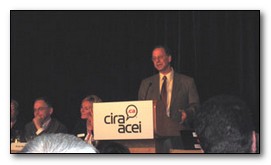 I attended a wildly animated, wonderfully amusing and thought provoking keynote talk by David Weinberger entitled ’The Business of the Miscellaneous’ at the Annual General Meeting of the CIRA this afternoon. Weinberger claims that society has solved the threat posed by information overload by creating more information. Additionally, he claims, the blurring of the line between the metadata and the actual data has further eroded the authority of the traditional media and given a newfound credibility to sources such as Wikipedia. A credibility that he asserts that comes from trust built on transparency.
I attended a wildly animated, wonderfully amusing and thought provoking keynote talk by David Weinberger entitled ’The Business of the Miscellaneous’ at the Annual General Meeting of the CIRA this afternoon. Weinberger claims that society has solved the threat posed by information overload by creating more information. Additionally, he claims, the blurring of the line between the metadata and the actual data has further eroded the authority of the traditional media and given a newfound credibility to sources such as Wikipedia. A credibility that he asserts that comes from trust built on transparency.
He began by looking at the orders of information, the first order being data, the second the metadata to describe and classify the first and the third being the digitization of this information and the agglomeration of the data with the metadata. His exploration started from an appreciation that the traditional print media, where editors and publishers decide the importance of information and impose their own classification system, has claimed ownership of information. It has further assumed an authority (one that was potentially dangerous, and certainly not sacred) that was tough to challenge in the print age. Weinberg contends that the digitization of information has allowed the user to retake ownership of the data through searches that don’t distinguish between the first two orders and thus remove the imposed authority.
He extended this to the booming trend of user-augmented collective information in a repository such as Wikipedia. He asks, why it is that Wikipedia has the credibility it has. Its not that the savvy user sees Wikipedia content as absolutely true, but that by exposing the process of editing and blatantly admitting its own failings (through warnings on data flagged as inaccurate, in need of sources, revision or of a biased nature) it establishes itself as one of us and being of us. Wikipedia gains credibility in a time when other media are losing credibility by being over possessive or protective over information ownership and failing to adequately admit (or even almost revel as Wikipedia does) to their own failings. It’s an interesting take on the collapse of traditional authority as expressed through the classification of knowledge.
The second big thing he identifies as a result of the digitization of information is that the quality of information being exchanged in the public sphere is experiencing a smarting up (as opposed to a dumbing down). As information can be easily and readily shared, mashed up and commented upon, it has gained new perspectives, and new context that allows us to ‘luxuriate in making things complex again.”

[…] approachable by the masses and he isn’t dumbing it down to do so. In the fashion of the David Weinberger talk I blogged previously, Rosling is challenging data ownership and allowing for individual […]